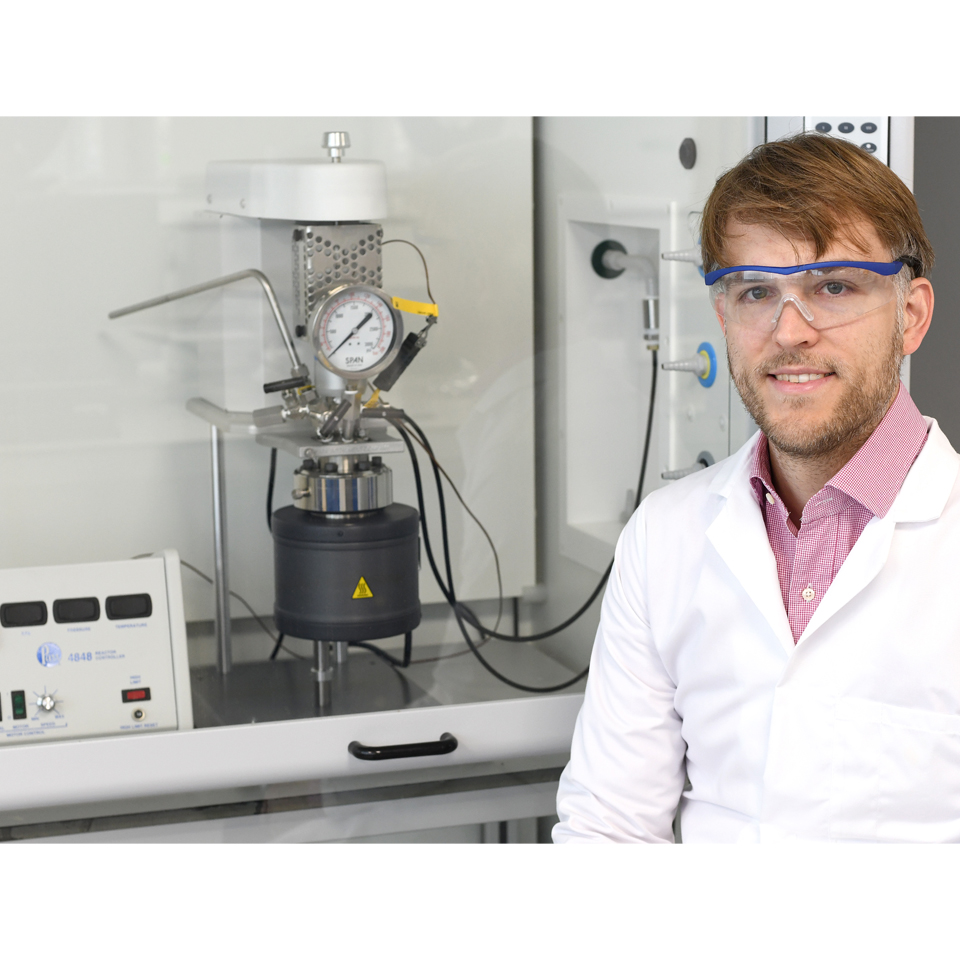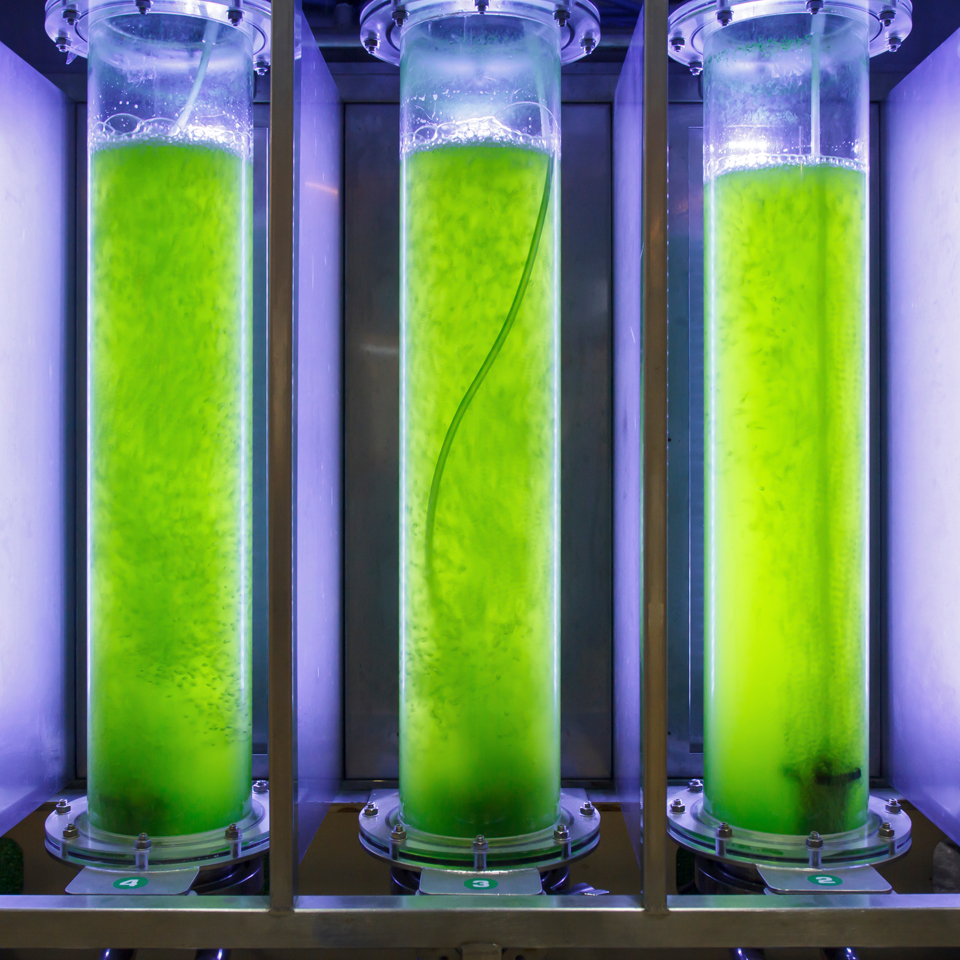Dr Jonathan Wagner
Senior Lecturer – Chemical Engineering
Dr Jonathan Wagner’s background is in thermochemical biomass conversion, catalytic bio-oil upgrading and algae process development and scale-up. His research focuses on combining conversion technologies to maximise energy recovery whilst realising additional benefits – including bioremediation, carbon sequestration and the production of high-value by-products. His work is part of global efforts to achieve resource security while reducing waste and pollution.
Biomass research addressing global resource security
As the only natural source of renewable organic carbon, biomass has been recognised as a key contributor for achieving the UK’s renewable energy targets, helping us to reach Net Zero. Responsible use of biobased resources also supports the United Nations’ Sustainable Development Goal 12 by “ensuring sustainable consumption and production patterns” – minimising the adverse impacts of modern practices on human health and the environment.
My research area is the development of new and cost-effective technologies for the biomass energy sector so that current barriers to wide-spread roll-out and adoption can be overcome.
Thermochemical processes – including pyrolysis and hydrothermal liquefaction – are particularly promising for converting a range of biomass feedstocks into bio-oils which can be upgraded into fuels compatible with existing infrastructure.
This means that we can use non-arable biomass. By-products of other activity – including agriculture, construction, forestry management and wastewater treatment – these materials are generally considered waste. However, being cheap, plentiful and renewable, they offer a long-term, sustainable way to meet our growing demand for biofuels.
I’m particularly interested in improving how non-arable biomass – woody, lignocellulosic crops – and algae – can be more efficiently and ecologically processed to produce bio-oils, bio-char and bio-gas, and then further upgraded into useful products.
To date, my research has made some really encouraging steps forward.

Working with Wessex Water, during my PhD, I researched the hydrothermal liquefaction of algae grown on wastewater. Using my own batch and continuous high-pressure reactors, I investigated the effect of algae composition and reaction conditions on the resulting bio-oil yield and composition.
By developing an innovative continuous-flow hydrothermal liquefaction reactor, I was able to study this complex four-phase reaction under industrially relevant conditions. Compared with existing technologies, this new system delivers improved oil quality and yield.
Related to this work, I’ve also advanced new bio-oil upgrading methods. Using bifunctional zeolite-supported nickel phosphide catalysts to denitrogenate algae-derived biooils provides a stable and low-cost alternative to existing sulphided refining catalysts.
Critically, I investigated new synthesis methods that avoid the formation of aluminium phosphate which hampers the process by reducing the catalyst’s surface area. So, it’s a more efficient way forward – more reliable and delivering a greater yield.
As a postdoctoral researcher on the Horizon2020 Photofuel projects, I worked with a consortium of European researchers and companies – including Neste Oil, Volkswagen and Alga4Fuel – to develop new algae strains which can be used to directly convert CO2 emissions into renewable biofuels.
My long-term goal is to develop commercially viable routes towards sustainable and low-carbon bioproducts – supporting global efforts to achieve resource security.

Unlike existing systems, fuel compounds are excreted into the culture medium, enabling facile harvesting without damaging the algae cells. As well as optimising cultivation conditions and studying scale-up, I evaluated the industrial feasibility of the developed processes by establishing detailed process models of the downstream separation requirements.
These models enabled like-for-like comparisons of different biobutanol recovery strategies from algae cultures and identified clear minimum performance targets for new fuel production processes.
More recently, I proposed and developed a new algae-based system for the purification of biomethane fuel from biogas produced during the anaerobic digestion of biomass residues like sewage sludge and food wastes. This novel system uses the recovered CO2 to produce algae biomass, reducing emissions without expensive CO2 export infrastructure.
This project proved that the halophilic microalgae Dunaliella can regenerate the carbonate absorbent required for the purification of biomethane. By combining with further hydrothermal stabilisation of the anaerobic digestate, we were able to use or capture over 80% of the initial biomass feed carbon – demonstrating the potential for net carbon negative biomethane fuel production.
I am one of the founding members of the Mini-CDT, SlowCat (Securing a Sustainable Future using Low Dimensional Catalysts). We’re focusing on the development of innovative targeted catalysts to treat and recover valuable products from dilute biorefinery waste streams.
As well as directly supervising two PhD students, I’m using my engineering and biotechnology expertise to ensure the industrial feasibility and applicability of the research developed within the CDT.
My research journey
I’ve always been interested in energy and, when I graduated from Bath with an MEng in Chemical Engineering, I joined BP’s Challenge Graduate Scheme.
This was a great opportunity to get an overview of the range of processes involved in oil and gas processing and gain hands-on engineering experience. I took real pride in helping to ensure safe and efficient plant operations.
However, despite this, I realised that I wanted to work with more sustainable forms of energy and decided to embark on a Doctorate in Sustainable Chemical technologies, focusing on the conversion of algae used for wastewater treatment into liquid fuels for transport.
I learned a lot along the way – ranging from fundamental analysis methods to how to design and build my own high-pressure reactors. Crucially, for my ongoing research, I also grasped the importance of looking at a whole system, rather than its individual processing steps. Taking this holistic approach means that problems with technology interfaces can be spotted and addressed early on.
Following my PhD, in 2017, I joined the Horizon2020 Photofuel project at Imperial College, working with researchers across Europe to develop new algae-based systems to convert carbon dioxide into liquid transport fuels.
I joined Loughborough as a Lecturer in 2018 and was promoted to Senior Lecturer in 2022 – it’s been a busy and rewarding few years.
In 2019, I secured two important funding awards – a Royal Society Equipment Grant and a Supergen Bioenergy Hub Flexible Grant. This funding supported research into the conversion of municipal solid waste into fuel and the development of an innovative algae-based biogas purification process, respectively.
Since 2020, I have been the Academic Programme Lead for the Interdisciplinary Centre for Circular Chemical Economy – part of the UK Government’s initiative to revolutionise resource management. Our aim is to reduce the reliance on fossil fuels by creating methods to recover and reuse olefins.
Over the years, my research has broadened to investigate a range of sources for biomass and my focus has shifted to chemical, rather than purely fuel, production.
My long-term goal is to develop commercially viable routes towards sustainable and low-carbon bioproducts – supporting global efforts to achieve resource security and reduce human impacts on the planet.
